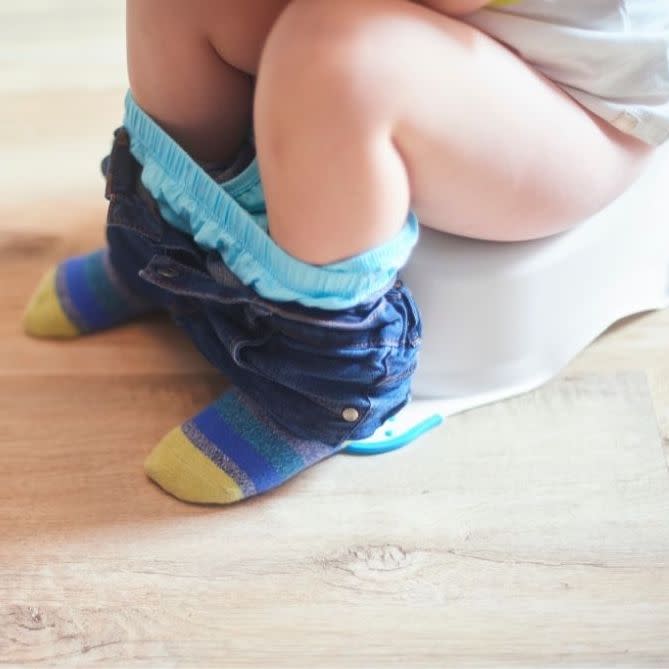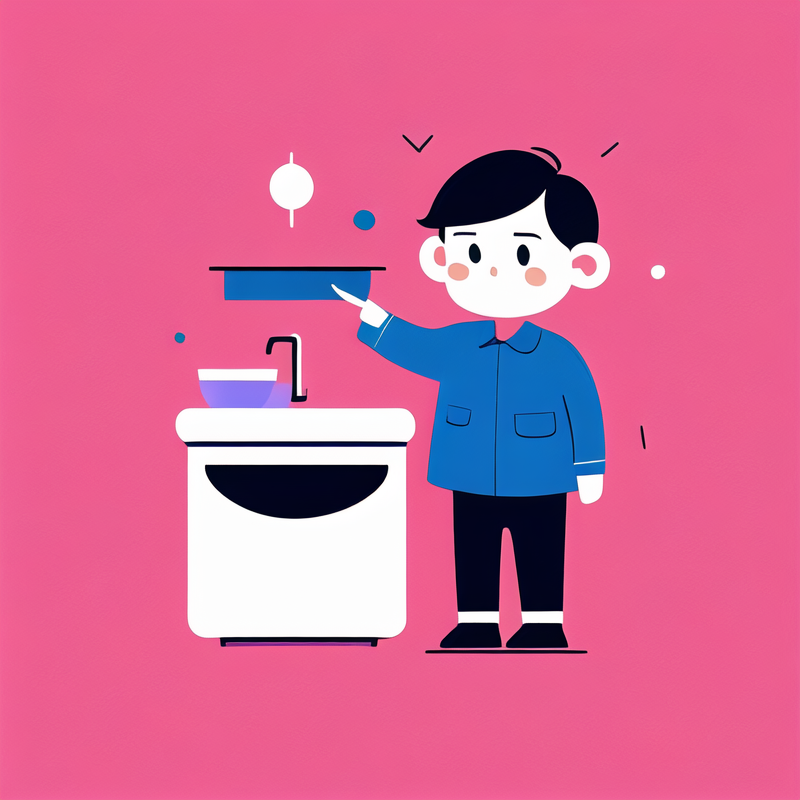Common Causes of Toddler Constipation
How to make a toddler poop? Understanding why constipation in toddlers occurs is key to addressing it effectively. Here are some factors that commonly contribute to this issue.

Dietary Factors and Their Impact on Toddler Bowel Movements
A child’s diet plays a central role in their bowel health. Insufficient fiber-rich foods such as fruits and vegetables can lead to constipation. Too many dairy products, processed foods, and drinks with added sugars might also upset a toddler’s digestive rhythm, making bowel movements irregular.
The Role of Potty Training and Bowel Movement Anxiety
Potty training can be a stressful time for children. Fear of the potty, negative bathroom experiences, or the pressure to succeed can create anxiety. This anxiety can cause a toddler to hold in their stool, leading to constipation. It’s important to approach potty training with patience and encouragement.
Possible Underlying Health Issues Affecting Bowel Habits
Constipation might signal more than just a diet or potty training issue. Some children suffer from conditions like irritable bowel syndrome or a sluggish thyroid, contributing to their challenges. Always consider a medical evaluation if you suspect an underlying condition is at play.
Symptoms and Signs of Constipation in Toddlers
Awareness of the symptoms and signs of constipation can aid in timely intervention. Keep an eye on your toddler’s bathroom habits to spot any issues early. Here are some key signals to look out for.
Recognizing Physical Struggles and Changes in Stool Patterns
Pay attention to how your toddler acts during bowel movements. Straining, grunting, or showing signs of pain can indicate constipation. Look for hard, dry stools, or if your toddler’s stool patterns change, with less frequent bowel movements.
Wet or dirty underwear can signal ‘overflow’ where liquid stool passes around hard, constipated stool. It is a distressing but common sign of constipation in young children.
Behavioral Indicators and Their Relation to Bowel Movements
How to make a toddler poop? Bowel movement avoidance can reflect underlying constipation. If your toddler resists using the toilet, seems fearful, or has decreased appetite, they might be constipated. Sudden changes in potty habits or a new preference for diapers may also be signs.
Constipation can cause a toddler to become less active or show less interest in play. They may also seem unusually irritable or upset. This discomfort can impact their overall mood and behavior.
Recognizing these signs is critical to addressing constipation effectively. Combining this awareness with the right dietary and potty training approaches can help your toddler find relief.

Steps to Alleviate Constipation in Toddlers
To help your toddler with constipation, there are several effective steps you can take.
Importance of a Balanced Diet Rich in Fiber
How to make a toddler poop? A good diet helps your child poop with ease. Include lots of fruits, vegetables, and whole grains. These foods have fiber which helps soften stool. Avoid too many low-fiber foods like cheese and meats. Make meals colorful and fun to attract your toddler.
Ensuring Adequate Hydration Throughout the Day
Kids need plenty of fluids to poop well. Offer water throughout the day. Limit sugary drinks; they aren’t good for hydration. Hydration helps keep stool soft so it moves easily. Let your child pick a fun cup or straw to encourage drinking water.
Encouraging Regular Physical Activity for Digestive Health
Active play aids digestion. Encourage your toddler to move, run, and play. Daily movement helps their bowel movements. Simple activities like walking and games keep their systems running well. This can reduce constipation.
Creating a Supportive Potty Routine
A supportive potty routine helps a lot with toddler constipation. Let’s explore steps to create one.
Establishing a Regular Schedule for Bathroom Breaks
Set times for your toddler to sit on the potty, like after meals or before bed. Consistency is key. A schedule helps their body recognize when it’s time to go.
Using Positive Reinforcement to Encourage Successful Potty Use
Celebrate every small success. Use stickers, happy dances, or extra storytime as rewards. This makes potty time fun, not scary. Your support means a lot to your toddler.
Addressing Fears and Anxieties About Toilet Use
Talk to your toddler about their fears. Use simple words. Show them how everyone uses the toilet. Keep calm and reassure them. Potty time should be worry-free.

When to Seek Medical Help
Many cases of constipation in toddlers can typically be managed at home with simple strategies. However, there are certain situations where you should proactively seek a pediatrician’s assistance. Recognizing these indicators is essential for ensuring that your child receives timely and appropriate care.
For instance, if your toddler experiences severe abdominal pain or discomfort that doesn’t seem to improve, it’s crucial to consult a doctor. Additionally, if your child has not had a bowel movement for several days or begins to exhibit signs of distress during attempts to poop, you should not hesitate to reach out for professional help.
Moreover, watch for symptoms such as blood in the stool or persistent vomiting, as these conditions may require immediate medical attention. Overall, being aware of these warning signs will empower you to take action and provide your child with the best possible care when needed. Remember, while home remedies can work effectively, the health of your toddler should always come first.
Indicators That It’s Time to Consult a Pediatrician
How to make a toddler poop? If your toddler shows persistent discomfort, it’s important to act. Here are clear signs to watch for:
- Your child has not had a bowel movement in several days.
- There is blood in their stool or toilet paper.
- They experience ongoing pain during bowel movements.
- Stomach aches that don’t go away after using the toilet.
- You notice any swelling in their belly.
- Laxatives or home remedies aren’t working.
When you see these signs, it’s best to call your doctor. They can help find the reason behind the constipation and offer the best solution.
Understanding Treatment Options, Including Laxatives
Doctors employ various methods to treat constipation. First and foremost, they often suggest making changes to the diet and increasing fluid intake. These dietary adjustments can include adding fiber-rich foods, like fruits and vegetables, which naturally promote bowel health.
In addition, doctors may recommend specific exercises designed to enhance your toddler’s digestion. Engaging in physical activity can stimulate the intestines, helping to alleviate constipation effectively.
If these initial strategies do not yield the desired results, doctors might consider prescribing laxatives or stool softeners. However, it’s crucial to always consult with a doctor before administering any medication to your child. They will provide guidance on the appropriate dosage and administration methods. By closely following their advice, you can help ensure that your toddler returns to regular, pain-free bowel movements in no time.
Long-Term Strategies to Prevent Constipation Recurrence
Consistent habits can help stop constipation from coming back. Below are key strategies for long-term relief.
Building Healthy Eating Habits Early On
Teach your toddler to love high-fiber foods. Serve fruits, veggies, and grains often. They keep poop soft.
Avoid too much fast food and sweets. They can make constipation worse. Offer water instead of juice or soda.
Sit together for meals. Make this a family time. It encourages good eating and digestion.
Involve your toddler in choosing and preparing foods. This can make them excited to eat healthily.
Incorporating Preventive Practices into Daily Routines
How to make a toddler poop? Stick to a bathroom routine. Go every day at the same time. This trains the body to poop regularly.
Keep active every day. Make time for play and movement. It helps the body stay regular.
Limit screen time. Too much sitting isn’t good for digestion or bowel health.
Watch for signs of constipation. If you spot trouble, act fast to avoid bigger issues.
Encourage your toddler to talk about bathroom experiences. Open talks can ease fears or anxieties.
Remember, small steps lead to big changes over time. Stay patient and keep at it.


